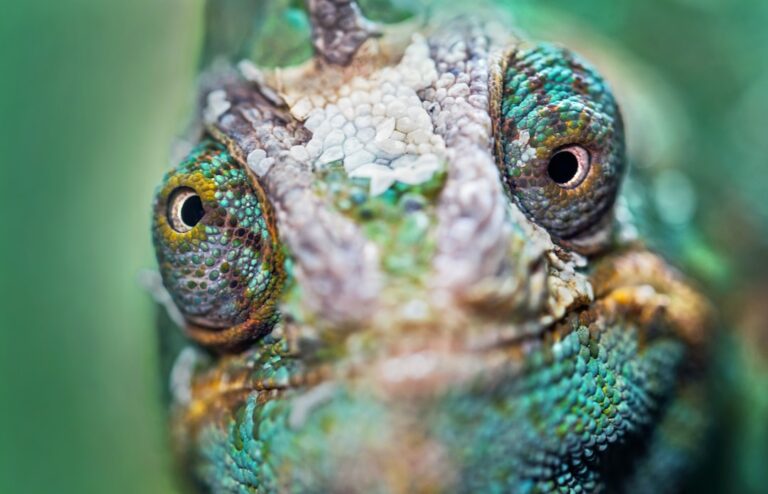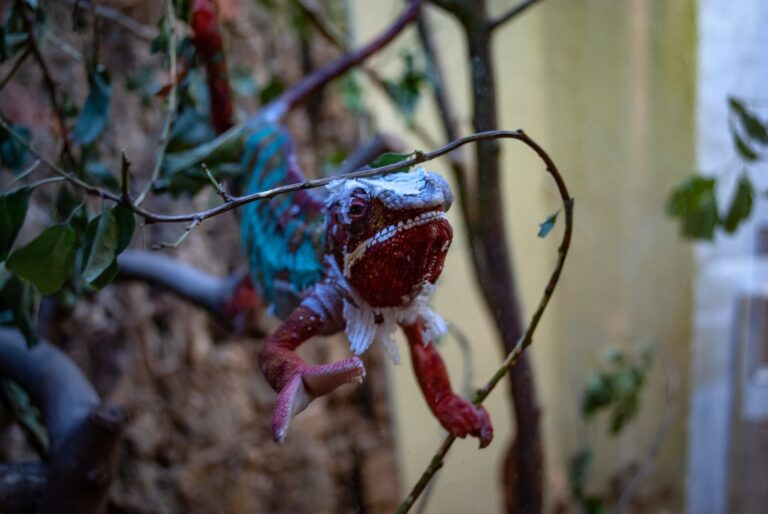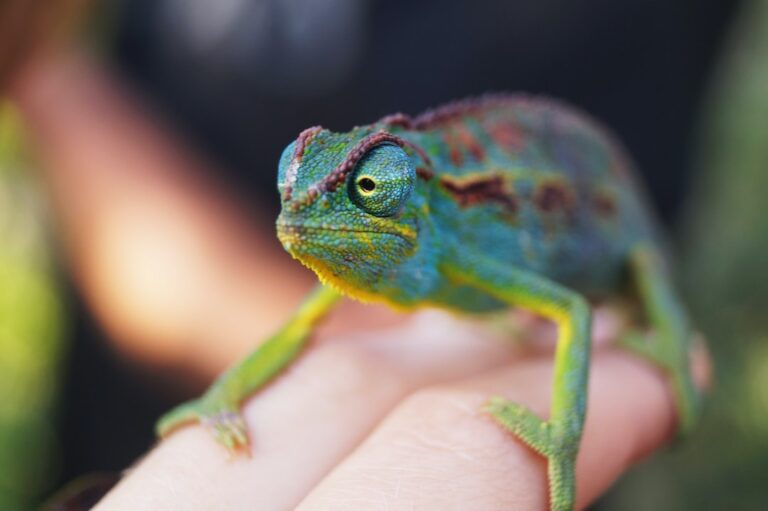How Much Do Chameleons Weigh?
Chameleons are fascinating creatures known for their ability to change color and blend into their surroundings. They are reptiles that belong to the family Chamaeleonidae and are native to Africa, Madagascar, and parts of southern Europe, Asia, and the Middle East. Chameleons have unique characteristics such as independently moving eyes, a long tongue for catching prey, and a prehensile tail for climbing.
Monitoring chameleon weight is crucial for their overall health and well-being. Weight can be an indicator of a chameleon’s overall health and can help identify any underlying health issues. It is important for chameleon owners to regularly weigh their pets to ensure they are maintaining a healthy weight.
Table of Contents
Factors that Affect Chameleon Weight
Several factors can affect the weight of a chameleon, including age, gender, species, environmental factors, and diet.
Age: Like most animals, chameleons go through growth stages. Younger chameleons may have a lower weight compared to adults. It is important to monitor their weight as they grow to ensure they are developing properly.
Gender: Male and female chameleons may have different weights due to sexual dimorphism. Males are typically larger and heavier than females.
Species: Different species of chameleons have different average weights. For example, the Veiled Chameleon (Chamaeleo calyptratus) is one of the larger species and can reach weights of up to 200 grams, while the Pygmy Chameleon (Rhampholeon spp.) is much smaller and typically weighs around 5 grams.
Environmental Factors: Temperature and humidity can also affect a chameleon’s weight. Extreme temperatures or humidity levels can cause stress or dehydration, leading to weight loss.
Diet and Feeding Habits: The diet of a chameleon plays a significant role in its weight. Chameleons are insectivores and primarily feed on insects such as crickets, mealworms, and flies. A balanced diet that provides the necessary nutrients is essential for maintaining a healthy weight.
Average Weight of Different Chameleon Species
Different chameleon species have different average weights. It is important for chameleon owners to know the average weight range for their specific species to ensure they are maintaining a healthy weight.
Some popular chameleon species and their average weight ranges include:
– Veiled Chameleon (Chamaeleo calyptratus): Adult males can weigh between 150-200 grams, while females typically weigh between 60-100 grams.
– Panther Chameleon (Furcifer pardalis): Adult males can weigh between 120-180 grams, while females typically weigh between 60-100 grams.
– Jackson’s Chameleon (Trioceros jacksonii): Adult males can weigh between 80-120 grams, while females typically weigh between 50-80 grams.
It is important to note that these are just average weight ranges and individual chameleons may vary in weight within these ranges. It is always best to consult with a veterinarian or experienced chameleon breeder for specific information about your chameleon’s ideal weight range.
How to Weigh a Chameleon
Weighing a chameleon can be a challenging task, as they are delicate creatures that can easily become stressed. However, with the right approach and tools, it can be done safely and accurately.
Here is a step-by-step guide on how to weigh your chameleon:
1. Choose a suitable scale: Use a digital kitchen scale or a small animal scale that can measure in grams or ounces. Make sure the scale is accurate and has a flat surface for the chameleon to sit on.
2. Prepare the scale: Place a clean, soft cloth or paper towel on the scale to provide a comfortable and secure surface for the chameleon. This will also prevent the chameleon’s claws from scratching the scale.
3. Prepare the chameleon: Gently pick up your chameleon and place it on the cloth or paper towel on the scale. Make sure to support its body and limbs to prevent any injuries.
4. Wait for the chameleon to settle: Chameleons can be skittish and may need some time to settle down on the scale. Allow them a few moments to adjust before taking the weight measurement.
5. Take the weight measurement: Once the chameleon is settled, take note of the weight displayed on the scale. It is best to record the weight in grams for accuracy.
6. Repeat regularly: It is important to weigh your chameleon regularly to monitor any weight fluctuations. Aim for weighing them at least once a month, or more frequently if you suspect any health issues.
Ideal Weight Range for Healthy Chameleons
Maintaining a healthy weight is crucial for chameleon longevity and overall health. The ideal weight range for chameleons can vary depending on their species, age, and gender.
Generally, a healthy chameleon should have a well-rounded body with no visible bones protruding. They should have good muscle tone and be active and alert. If a chameleon appears too thin or overweight, it may indicate an underlying health issue.
It is important to consult with a veterinarian or experienced chameleon breeder to determine the ideal weight range for your specific chameleon species. They can provide guidance on what is considered a healthy weight for your pet.
The Importance of Monitoring Chameleon Weight
Monitoring chameleon weight is crucial for their overall health and well-being. Weight fluctuations can indicate underlying health issues or improper care.
Regularly weighing your chameleon allows you to track their growth and development, ensuring they are reaching their milestones and maintaining a healthy weight. It can also help identify any sudden weight loss or gain, which may be a sign of illness or improper diet.
By monitoring their weight, you can take proactive measures to address any health issues early on, increasing the chances of successful treatment and recovery.
Weight Fluctuations in Chameleons and What They Mean
Weight fluctuations in chameleons can occur for various reasons. It is important to understand the common causes of weight fluctuations and how to address them.
Common reasons for weight fluctuations in chameleons include:
1. Illness: Weight loss can be a symptom of various illnesses, such as infections, parasites, or metabolic disorders. If your chameleon is experiencing sudden weight loss, it is important to consult with a veterinarian to determine the underlying cause and appropriate treatment.
2. Improper diet: A diet lacking in essential nutrients can lead to weight loss or poor weight gain. It is important to provide a balanced diet that includes a variety of insects and supplements to ensure your chameleon is getting the necessary nutrients.
3. Stress: Chameleons are sensitive creatures that can easily become stressed. Stress can lead to decreased appetite and weight loss. It is important to provide a stress-free environment for your chameleon and minimize any potential stressors.
4. Overfeeding: Overfeeding can lead to obesity in chameleons, which can have negative health consequences. It is important to provide an appropriate amount of food based on your chameleon’s size and species.
If you notice any significant weight fluctuations in your chameleon, it is best to consult with a veterinarian or experienced chameleon breeder for guidance on how to address the issue.
How Diet Affects Chameleon Weight
Diet plays a significant role in maintaining a healthy weight for chameleons. A balanced diet that provides the necessary nutrients is essential for their overall health and well-being.
Chameleons are insectivores and primarily feed on insects such as crickets, mealworms, and flies. It is important to provide a variety of insects to ensure they are getting a diverse range of nutrients.
In addition to insects, chameleons may also benefit from the occasional supplementation of fruits and vegetables. However, it is important to note that chameleons have specific dietary requirements and not all fruits and vegetables are suitable for them. Consult with a veterinarian or experienced chameleon breeder for guidance on appropriate supplementation.
Feeding habits also play a role in chameleon weight management. Chameleons are known to be opportunistic feeders, meaning they will eat whenever food is available. It is important to establish a feeding schedule and provide appropriate portion sizes to prevent overfeeding or underfeeding.
Common Mistakes in Chameleon Weight Management
Chameleon owners may make common mistakes in managing their weight, which can have negative consequences on their health. It is important to be aware of these mistakes and take proactive measures to avoid them.
Some common mistakes in chameleon weight management include:
1. Inadequate diet: Providing an inadequate diet lacking in essential nutrients can lead to weight loss or poor weight gain. It is important to research and provide a balanced diet that meets your chameleon’s specific dietary requirements.
2. Overfeeding: Overfeeding can lead to obesity in chameleons, which can have negative health consequences. It is important to provide an appropriate amount of food based on your chameleon’s size and species.
3. Inconsistent weighing: Regularly weighing your chameleon allows you to monitor their weight and identify any fluctuations. Inconsistent weighing can lead to missed weight changes or delayed detection of health issues.
4. Ignoring weight fluctuations: Weight fluctuations can indicate underlying health issues or improper care. Ignoring these fluctuations can lead to delayed treatment and potential complications.
By being aware of these common mistakes, chameleon owners can take proactive measures to ensure their pets maintain a healthy weight.
Maintaining a Healthy Weight for Your Chameleon
Maintaining a healthy weight is crucial for the overall health and well-being of chameleons. Regularly monitoring their weight allows you to track their growth and development, identify any weight fluctuations, and address any underlying health issues.
Factors such as age, gender, species, environmental factors, and diet can affect a chameleon’s weight. It is important to be aware of these factors and provide appropriate care to ensure your chameleon maintains a healthy weight.
By following proper weighing techniques, providing a balanced diet, and avoiding common mistakes in weight management, chameleon owners can ensure their pets live long and healthy lives. Regular veterinary check-ups are also recommended to monitor your chameleon’s overall health and address any concerns.
If you’re interested in learning more about chameleons, you might also want to check out this article on the smallest chameleon pets. It provides fascinating insights into the different species of chameleons that make great pets and highlights their unique characteristics. From their tiny size to their vibrant colors, these little creatures are sure to captivate any reptile enthusiast.







